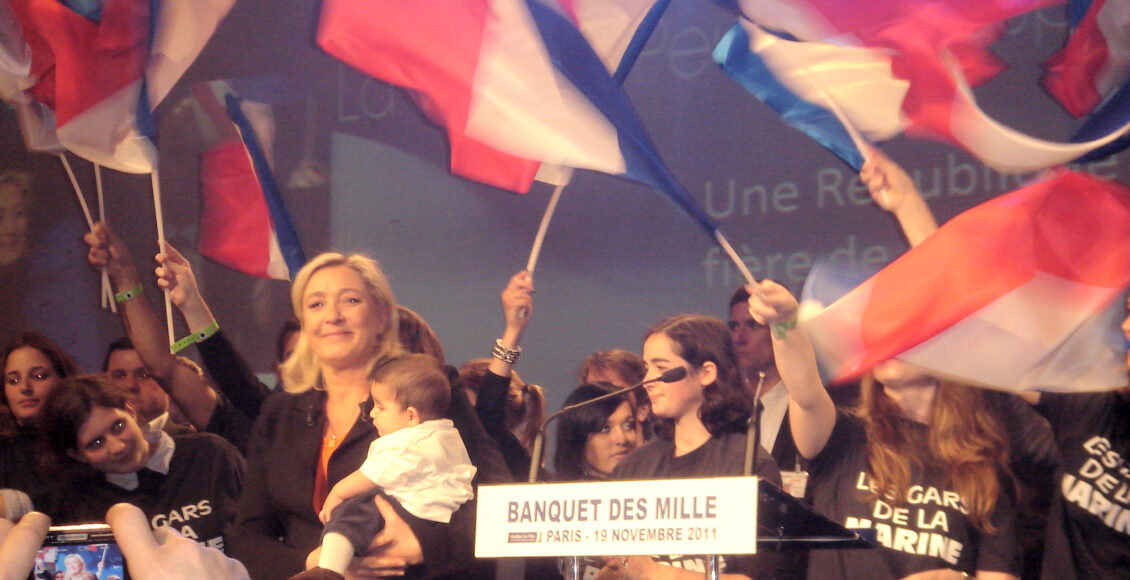Far-Right Europe’s Feminomenons

Historically, there has been a clash of compatibility between power and womanhood as perceived by wider society. In Sandra Gilbert and Susan Gubar’s essay “Infection in the Sentence”, they introduce the idea of “anxiety of authorship” amongst women writers, which stems from “fears of that authority which seems to the female artist to be by definition inappropriate to her sex”. Some have attempted to reconcile the perceived incompatibility between assuming positions of power and womanhood by portraying themselves as merely concerned mothers and appealing to traditional values. Others, like Margaret Thatcher, were seen as masculine figures (“Iron Ladies”) with traits compatible with the demands of high office. Today, Western Europe has seen a rise in women leaders, particularly at the top of far right parties. This shift in demography brings with it a new phenomenon of justifications of feminine presence in positions of far right authority, justifications built on nativism and racial fear-mongering.
The face of the Alternative for Germany (AfD), the far right party currently in power of the country, is Alice Weidel. Voters resonate with the AfD’s mission to preserve traditionalism and protect German leitkultur, which translates roughly to “guiding” or “core” culture. The majority of these voters are men in their thirties, who flocked to support the AfD in response to the introduction of gender education to German school curriculums and the sexual assault attacks of Cologne in 2015. The party also made open remarks opposing gay marriage and adoption for gay couples. Alice Weidel herself is married to a woman, with whom she has two adopted children.
Weidel asserts both indirectly and directly in her speeches that the AfD could not possibly be homophobic when they have a lesbian leader. She scoffs at the idea that she or her party could be intolerant when they in fact seek to protect German homosexuals from attack by “Muslim gangs.” She diverts the issue of gay marriage as irrelevant when gay couples cannot even go out in public because of the danger that these “Muslim gangs” pose. Weidel’s party says it will protect Germany from the conservative Islamic apartheid inflicted by hijabis, or “headscarf girls” as she referred to them, who do not belong in the country. They will protect the economy from Merkel’s immigrants who drain the country of money through its welfare budget. It seems to the AfD that national economic, social, and security issues can be attributed to the abundance of “knife-wielding” Muslim men and “headscarf girls” who attack the tolerant and peaceful German populace.
Marine Le Pen, deputy of the French national assembly and member of the National Rally far right party in France, is currently on trial for embezzling funds from the European Union. The National Rally, formerly known as the National Front, was founded by Jean-Marie Le Pen, a man convicted for hate speech fifteen times, after claiming the Nazi occupation “was not particularly inhumane.” Marine Le Pen is his daughter and former leader of the National Rally, though she expelled the senior Le Pen from his party for his continuous incidents of hate speech. Without the party’s preceding open racism, the National Rally now opts for more palatably packaged ethnonationalism on which it runs its campaign. Le Pen promised her followers a total ban on the hijab in public spaces as a part of her presidential campaign. She referred to Muslim prayer in public as symbolic of “occupation” akin to that of the Nazis. The National Rally pledges to remove nationality rights for children of immigrants born in France and to ban citizens of dual nationality from holding state positions. Many of those with dual nationalities in France are from France’s former colonies. Jordan Bardella, current head of the National Rally, languished the “Islamisation” of his childhood neighbourhood.
The French far right sprouted new limbs as Marine Le Pen’s niece, Marion Marechal, started her own far right party this year, Identity-Freedoms. A self-proclaimed “anti-woke” party, Identity-Freedoms identifies it’s tenets as the protection of French Christian heritage and freedoms, as well as warding off the dangers imposed on French society via Islamification. In her speech to hundreds of Americans at the Conservative Political Action Conference in Maryland, Marechal voiced the need for France “to be great again” and for the French people to have their country back. The speech was received with great excitement and even a “Vive la France!” from one audience member. Both Marine Le Pen and Marion Marechal have emphasized the need to fight against the Islamization of France because of the threat it poses to the freedoms of French women. Marechal and Le Pen plan to form a coalition of far right parties in the next French election, united on their core stances.

Unsurprisingly on-trend, Italy’s first female prime minister and head of the far right Brothers of Italy party, Giorgia Meloni, ran her campaign on an anti-immigration platform that sought to protect the Italian identity that she claimed was at risk of being wiped out. Meloni maintains that there is “no place for Islam in Europe” and in a speech to her followers declared herself “a Christian-Italian mother and woman.” She wants to “block all forms of Islamic immigration until they clear up their ideas.” An adamant anti-feminist, Meloni disavows Islamic values because they pose a terrorist threat to the Christian-Italian mothers and families of Italy, and declares her party one that seeks to protect women’s rights. At the moment, the Brothers of Italy are overseeing an effort to deport African and Middle Eastern refugees arriving on the shores of Italy to camps in Albania.

Weidel, Le Pen, Marechal, and Meloni are not outliers in the current European polity. They are emblematic of a new age of communicating fascist and nationalist ideologies to the public. The millions of voters who are drawn to their parties do not look at the discrepancies between the values they preach and their personal lives, nor data outlining the credibility of threats to national identities and European women. Rather, the shining face of a proud blonde European patriot calling for the expulsion of ethnic groups from their countries as a solution to their everyday problems and identity issues is enough to show hate without guilt. It is enough to make people and politicians say what usually would be deemed hate speech, with their newfound woman-oriented zeal. Thus, the emboldened far right of Europe begins to test new limits of open anti-immigrant sentiment, and feels encouraged to perpetuate the vision of the immigrant or liberal scapegoat without negative consequence. Those encouraging this behaviour are the women at the heads of the far right who have found the perfect dynamic for their role in politics. Woman and patriarchal power are reconciled through the might of populist xenophobia.
The consequences of the rhetoric and power of these parties will not only embolden the patriots of their countries, but will also alienate the millions of Muslims living in Germany, France, and Italy. Those who were born and raised within a European culture that now rejects them will be the most vulnerable to radicalization, seeking ideological refuge not in critically thinking moderate groups but rather the other ends of extremes. This will only further fuel the femonationalists, who seek radicals as scapegoats for their thriving campaigns. We are only beginning to see the impacts of this far-right phenomenon, but in the coming years we should be all watching Europe closely.
Featured image: “File:Marine Le Pen, bébé, drapeaux, banquet des Mille3louis maitrier.jpg” by NdFrayssinet is licensed under CC BY-SA 3.0.
Edited by Josh Heimann.
